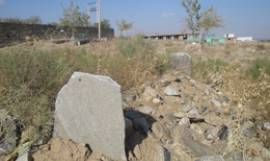By Jamshed Malakzai
For the death of three sons in the war in the eighties Keshwara, 65, gets 8000 Afs (145 USD) from the government. She lives in Jalalabad with her last surviving son, and tries to forget the despair and hardship of the past. A testimony*
Keshwara remembers it was 1989. The Soviet army had just withdrawn from Afghanistan, and the war was now between government troops and mujahedin armed by the US. She was walking to the Zakhan military post on the banks of the Kunar river in Shewa district, Nangarhar, to get news of her son, who was posted there as an officer.
Suddenly overhead she heard crows cawing. There were several circling in the sky. They were carrying bad news for her, she says her belief intact in a superstition that is common across many countries in the region. Even more anxious she raced ahead when the local mujahedin commander, who was called Prang (the lion), shouted to her from close by. "If you have come for news of your son he's dead. The mujahedin arrested and killed him," he said.
Life had dealt Keshwara a blow only a year ago. Her husband had died leaving her with four sons.
"My husband was Amir Mohammad Khan. Only one year had passed since his death. My tears had hardly dried when I was faced with the death of my younger son. I should have died with the news but God gave me strength," she says.

Photo: TKG
Two of Keshwara's sons were in the army. They had been forcibly recruited by Dr Najibullah's government. "The lips of Wali Mohammad and Mohammad Rahim (her two sons) had not become black (an Afghan way of saying they were both juveniles) but the district authorities forcibly conscripted them," she says. "Wali Mohammad was sent to Zakhan Baba and Mohammad Rahim to the district headquarters."
Zakhan post was attacked by mujahedin in a battle that claimed the lives of many soldiers. Keshwara says she looked for her son's body among the dead but he could not be found.
Tragedy Haunts
Forty days later the mujahedin gave her a bag but his body was not inside. All it contained was "some hair of Wali Mohammad, his shoes, a tin of cigarettes and part of his trouser. I cried a lot but who was there to hear me?" she asks. Now stoical, she adds, "I put all the things in a shroud and buried them after a funeral prayer in the graveyard."
Keshwara has never been able to ask the mujahedin how her son was killed, or what happened to his body. All she has are unanswered questions: where was his body thrown, what did Commander Prang have to do with his death, who is to blame?
The fighting in Shewa intensified after the storming of the Zakhan military post. Mujahedin killed Keshwara's second son Mohammad Rahim.
"I heard the firing. They (mujahedin) had attacked Pachahan (a historical place), which was next to the district office. My son was shot. One of our relatives who was with the mujahedin, swapped his body with a dead mujahidin and brought the bier to our house," she says. Her son left behind a young widow and a granddaughter.
The hardest loss was that of her eldest son Mohammad Nayeem. Old enough to be conscripted he had gone into hiding with his mother's help when government officials in Shewa were scouting for new recruits. Keshwara had not realised that her underage teenagers were also at risk.
"My elder son stayed hidden at home for 60 days for fear of compulsory military service. He was not able to leave the house even for his brothers' funeral," she remembers.
Mindless killing
When the mujahedin took over Shewa district they killed many young people accusing them of links with the government and military. People fled their homes in fear. Her eldest son, who had never joined the army, started a grain business. He would buy wheat and maize from local farmers and sell it in the bazaar. One day he was taking grain to Jalalabad when he came under attack from the mujahedin. His body was brought back to Keshwara's house. "They killed him claiming he was a communist," says the distraught mother. "I was left with only one son, Gul Mohammad, the youngest."
The mother and son slipped across the border into Pakistan as refugees in 1989.
Life was hard, but they slowly prospered. Both of them worked. Within a few years they had saved enough to make their own house, and for Gul Mohammad to marry. "Thanks to God now he has four sons, and we have again created a happy family. We returned to our country when Karzai came to power," says Keshwara.
She has never been back to her village in Shewa district. "My heart would be uneasy," she says. "I would go to my sons' graves, and my sadness would return."
* The testimonies of survivors of war crimes are our contribution to creating greater public awareness about people's hopes and claims for justice, reconciliation and peace. These testimonies and life stories are the basis for a radio drama that is being broadcast by seven Killid radios.



